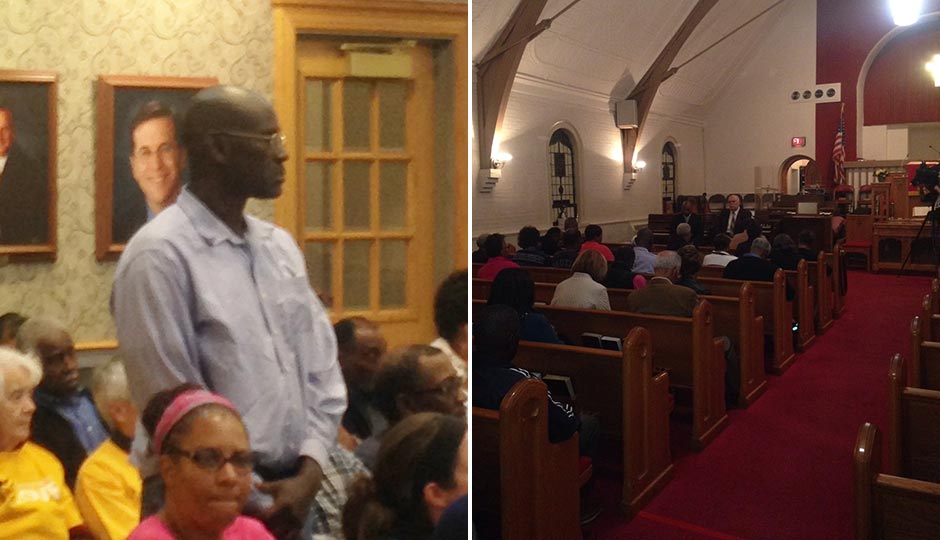South Ardmore Residents Speak Out Against Police Treatment

Nathaniel Williams at the Lower Merion Township Commissioners meeting (left); the prayer vigil at Zion Baptist Church before the meeting (right). Photos | Sandy Smith
Correction: A quote in the original publication of this story was incorrectly attributed to Commissioner Joshua Grimes. It was actually said by Commissioner Brian Gordon.
The snow shovels may still be in storage in Ardmore, but they’ll be coming back out soon, and when they do, the residents of South Ardmore would rather not use them while keeping one eye cocked for the Lower Merion Township Police.
They made this point and more loud and clear to the Township Commissioners at their regular meeting last night at the Township Building.
The triggering event that brought some 60 to 80 African American township residents and their white neighbors to the meeting was a recent incident in which township police manhandled 58-year-old Nathaniel Williams as he was waiting for a bus across the street from the Ardmore branch of TD Bank. The bank had been robbed, and police were responding to a call stating that a “black male in a hoodie wearing glasses” had done the deed.
Williams was all three. But, after he had been forced to his knees and handcuffed, it quickly became clear that he was not the robber. Nonetheless, several officers continued to hold him until a bank employee came across the street to confirm that he was not the robber.
This was far from the first time that a black Lower Merion Township resident had been treated in this fashion under suspicion of a crime he did not commit. And the residents who called for outside oversight of the police among other moves designed to ensure that the LMT cops treat all residents the same reminded the commissioners that they had asked for these things before.
“There is no reason for excessive force under these circumstances,” Diane Robertson, president of the Main Line branch of the NAACP, told the commissioners and Police Superintendent Michael J. McGrath. “This process that includes that excessive force all the time cannot be the status quo. Had the description been ‘a white male in a business suit’ walking down the street, and that person were stopped, would they have been forced down on their knees? Would they have been handcuffed? Somehow I think not.”
The South Ardmore residents had come before the commission in February of last year after a similar incident involving two teenagers detained while shoveling snow led them to ask the commissioners to appoint an independent panel to review police procedures in place of what they consider an ineffective Police and Community Relations Committee. One resident related a similar incident during the public comment session on Superintendent McGrath’s monthly report to the commissioners.
Lee X, who works for the township Parks and Recreation Department, described an incident in which police officers also forced him to the ground and handcuffed him as he was heading home from his shift. “I asked, ‘What did I do?’” he said. “They said, ‘Get down on your knees.’ I asked again, ‘What did I do?’”
It turned out that someone had raped a woman in Villanova. That someone was “a black male with dreadlocks.”
“Unfortunately, I’m not a member of a church, so I had nobody backing me up,” he said. The evening’s polite protest had begun with a prayer vigil at Zion Baptist Church in South Ardmore, where Williams was a member of the congregation.
The church’s pastor, James Powlett Sr., had opened the testimony by expressing hope that change would come. “We believe all lives matter and we know our police have a hard job,” he said. “But I would ask that you review their policies of detention, search and seizure. “People are negative. They say, ‘Nothing’s going to change. The beat will go on.’ But I’m here today to say that deep in my heart, I do believe that we will overcome.”
Several of the commissioners responded with similar sentiments after the testimony ended. “Officers need to be in the community so that residents get to know them and they get to know the neighborhood,” Commissioner Brian Gordon (D-Ward 12) said, echoing calls from some who testified for implementation of a community policing strategy in the township.
“This meeting caught me by surprise, but maybe that’s the best way,” said Commissioner Scott Zelov (R-Ward 10). “We’re trying to empathize with your plight. We need you to help us.” Zelov went on to express surprise to learn that meetings of the township Police and Community Relations Committee were not public.
Commissioner Anna Durbin (D-Ward 8) said, “One of the reasons we moved to Ardmore is because we wanted to live in a community with more than one type of person in it.” Referring to testimony from another lifelong Ardmore resident who recounted a young white woman who threatened her with calling the cops for driving too slow and told her to “get your black ass back to Philadelphia where you came from,” Durbin said, “We have to educate white people in our community not to view black people like that.”
But one commissioner took some exception to the general sentiment that the township’s governing board was insufficiently attentive to the issue of equal treatment. “My leadership has been placed under attack. To say that it’s my fault is wrong,” said Commissioner Brian Gordon. Commission President Elizabeth Rogan (D-Ward 7) offered an apology to the residents and told them, “You tell us you’re second-class citizens. You’re not.” The audience let it be known that they begged to differ with her assessment.
“Nobody knows how to solve [the problem], but the only way to solve it is to keep talking to each other,” Durbin said at the end. “But along with talking to each other, we need to come up with some concrete steps we can take.”
The South Ardmore residents recommended some steps in their testimony. Along with community policing and an outside police review, they included use of body cameras and increased training for officers. For now, however, the immediate next step will be another community meeting with the commissioners, tentatively scheduled for November 17th, but subject to change.
Follow @MarketStEl on Twitter.


